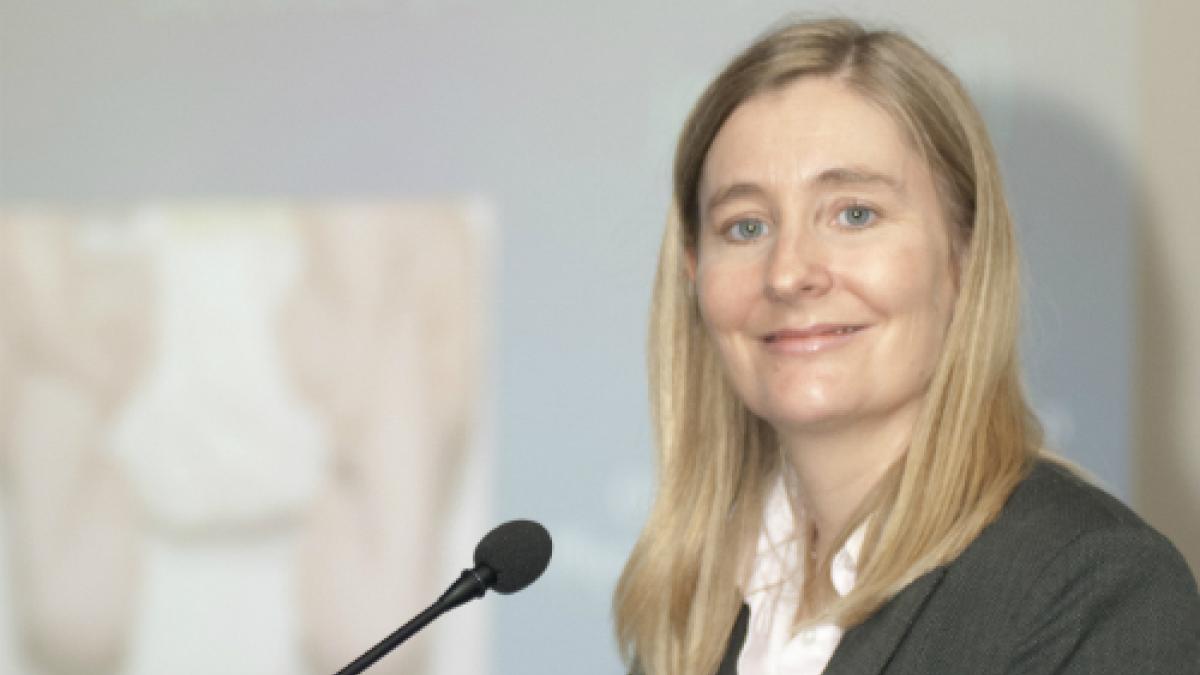The CSP has undertaken to continue to clarify scope of practice issues raised by a trailblazing approach to the treatment of children with club foot.

Sarah Paterson addresses the CSP Scotland conference. Photo: Simon Saffery
The novel intervention by a CSP member, which has helped reduce waiting times, is raising questions about the future direction of advanced physiotherapy practice, delegates at the CSP Scotland conference in Perth on 9 March heard.
Since 2015 Sarah Paterson, orthopaedic advanced practice physiotherapist at the Royal Hospital for Sick Children, Edinburgh, has carried out 36 Achilles tenotomies, a minor surgical procedure to release the tendon, with a 100 per cent success rate.
She leads and delivers a service using the Ponsetti technique which involves a series of manipulations and plaster casts, surgery, and long-term bracing.
Ms Paterson said that her capacity to carry out the surgery has reduced orthopaedic waiting times, as the surgeon can be elsewhere, has cut overnight stays and provided a more timely service.
Impact
She said: ‘The impact for patients and the parents is that they get expert care for the total management of the child born with club feet.’
The CSP has recently clarified that surgery does not currently fall within the scope of UK physiotherapy practice, although it recognises this specific procedure is within the scope of the individual’s practice.
However this does not mean that members cannot undertake activities that they are called upon and recognised to perform by their employers
Key issues
‘The key issue,’ said Sally Gosling, assistant director for practice and development, speaking after the conference, ‘is that the individual practitioner has been supported in developing their competence to perform the particular activity or procedure, that there is accountability for decisions and actions, and that the insurance cover is clear.’
Ms Paterson can continue to operate under her employer’s service delivery protocols and insurance but said: ‘I am asking questions about where I go now.
‘I’m not doing the surgery because I’m a physiotherapist but I am doing it by virtue of being a physiotherapist. It’s innovating based on the fact that I am a physiotherapist. I want to be safe, effective, competent and insured.’
Sara Conroy, the CSPs Scotland professional advisor, emphasised that the CSP very much wants to push the boundaries.
‘We need trailblazers. We will continue to work with Sarah and people round the country. It’s not in scope of the profession right now but who knows what will happen in the future,’ she said.
Further information
The CSP’s guidance on scope of practice distinguishes between the collective scope of practice of the profession and specific activities beyond this that individual members may take on, with their employer’s approval, that contributes to and enhances service delivery and patient care.
CSP guidance is clear that UK physiotherapy scope of practice has evolved considerably, and will continue to evolve. The CSP has criteria and processes for keeping the profession’s scope of practice under review and for ensuring that the profession’s collective scope evolves to respond to changing patient and service needs safely and effectively.
A key element includes keeping under review innovations in individuals’ personal scope of practice and engaging in informed debated on their potential implications for the development of the profession.
Find Out More
Number of subscribers: 1